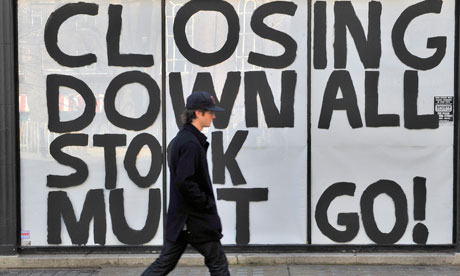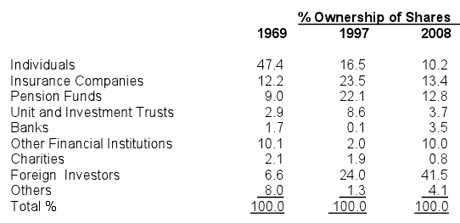Most people across the country will have been using this week to recover from hangovers and colds following a little overindulgence at Christmas.
 Similar things have been said about the economy - that "we" overindulged in credit and excess and now have to face the inevitable consequence - austerity.
Similar things have been said about the economy - that "we" overindulged in credit and excess and now have to face the inevitable consequence - austerity.The "we" in this story depends on whom you blame for the crisis. And even the most liberal commentators are now pointing the blame firmly at top bankers and finance leaders.
But how long will the hangover from the initial crisis, where the economy seems to be perpetually stuttering, last?
For most of next year, according to the centre-left think tank Institute for Public Policy Research (IPPR).
In his new year's message IPPR director Tony Dolphin points to a bleak 2012 for ordinary people citing the fallout from the eurozone crisis and the dire consequences of government imposed cuts.
"The eurozone crisis is unresolved and country after country is being forced to adopt extreme austerity measures that will result in large falls in output. As a result, the whole eurozone economy is believed to be back in a mild recession," he said.
A double-dip recession in Britain has been mooted for some time and can only be avoided by relaxing austerity measures, increased investment and an uplift in the spending power of the average worker.
Hardly long-term or revolutionary stuff but is it going to happen?
Political economist and tax justice campaigner Richard Murphy is not optimistic.
"Since consumer spending, exports and business investment aren't going to increase right now the only reason why the economy will change direction in 2012 is if the government decides to boost it.
"Osborne has committed himself not to do that. He won't cut taxes - even though his party would like that - and he won't spend even though the economy needs it, because he has committed himself to austerity."
Murphy believes Osborne's sole interest is the market and its masters.
But politically the Tories are committed to discrediting the Labour opposition particularly as austerity is affecting not just working-class and unemployed people but professionals and middle-class people too.
"He (Osborne) is using austerity supposedly to keep the markets happy - although there appear to be ample signs they would love a stimulus as they're suffering. But that leaves him in a hole with that option.
"He's also done it to make clear he's not the tax and spend party he says Labour were. So for two reasons - his credibility with the markets and the credibility of his anti-Labour Party narrative - he's got himself into a corner he can't get out of and it's all of his own making to suit his own political narrative.
"The trouble is, we pay the price for it.
"Labour's challenge is to break the idea this is tax and spend. It has to use the words 'jobs' and 'investment' often. The challenge is to find the language that shatters Osborne and the myth he's created."
There are plenty of suggestions for a counter-narrative for Miliband - as Murphy suggests - emanating from respected economists and Labour-affiliated unions.
Michael Burke writing in the Socialist Economic Bulletin yesterday lays out a Keynesian response to the crisis arguing that government investment in the economy can have a "multiplier effect" on the private sector.
"Since each economic sector responds variably to a change in another sector's activity, and often with a time lag, it is impossible to assign a precisely distributed causal effect of a change in fiscal policy. But we have noted above that Labour's increased spending of 1.8 per cent of GDP led to a recovery, which added 2.8 per cent to GDP.
"This demonstrates the way the state can lead economic activity in total. This is what Keynes called the 'multiplier effect' as the private sector responds to increased government spending. In this case the multiplier is 1.56 (the ratio of 2.8 per cent to increased spending equal to 1.8 per cent of GDP)."
Highlighting the vital role of the construction sector in any sustained and consistent economic recovery, Burke busts the myth there is no money left.
"George Osborne has provided £40bn in 'credit easing' to small and medium sized enterprises. They will not build homes, provide decent affordable housing and employ workers with these funds.
"But the state could because it is a vastly more efficient provider of large-scale housing as well as infrastructure projects."
Capitalism needs to have a degree of growth in order to maintain the status quo.
But the government is anxious to keep its chums in the private sector happy even if it means sacrificing the wider economy, including restricting growth in the short-term.
State intervention of this kind would, Burke adds, "Remove the main responsibility for construction from the hands of the private sector and place it in the hands of the public sector.
"It seems that nationalisation is only permissible when bondholders and shareholders are being rescued."
And Left Economic Advisory Panel co-ordinator Andrew Fisher points out that in the long-term, maintaining steady growth and reducing employment will require an overhaul of the bankers themselves.
"We need not just a national investment bank but the public ownership of all banks and control of the finance sector to redirect investment to create jobs and build the infrastructure we need."









